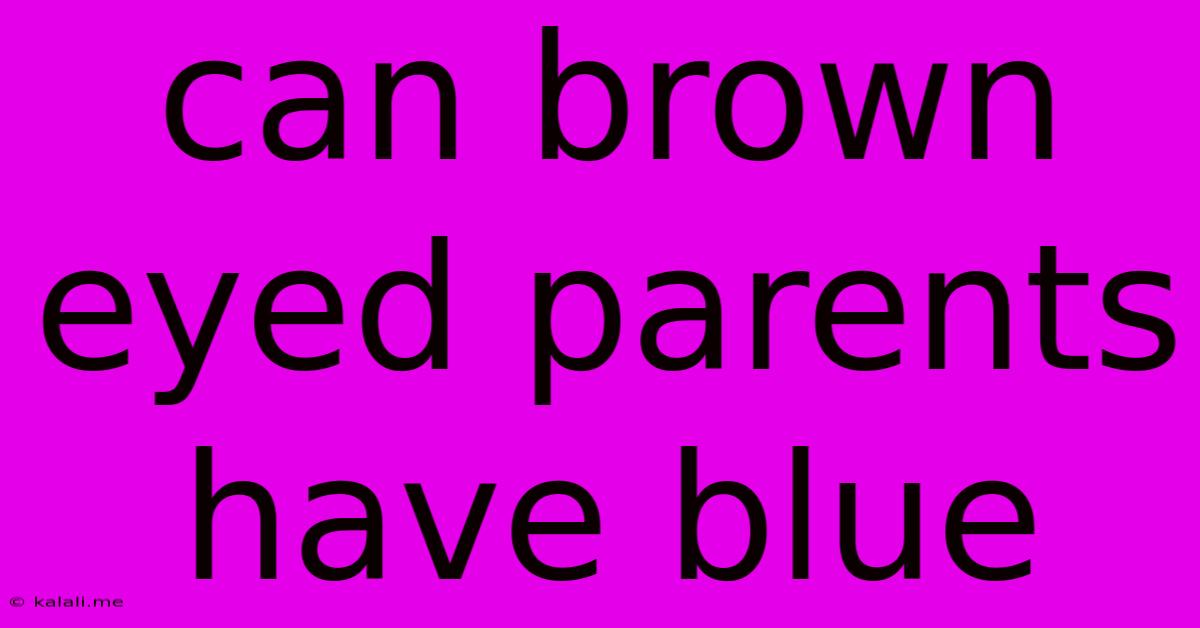Can Brown Eyed Parents Have Blue
Kalali
May 10, 2025 · 3 min read

Table of Contents
Can Brown-Eyed Parents Have Blue-Eyed Children? The Genetics of Eye Color
The captivating mystery of eye color inheritance has intrigued many. It's a common question: can two brown-eyed parents have a blue-eyed child? The short answer is yes, and understanding how this is possible requires a dive into the fascinating world of genetics. This article will explore the science behind eye color inheritance, explaining how blue eyes can emerge from brown-eyed parents.
Understanding Eye Color Inheritance: Beyond Simple Dominance
While often simplified, eye color inheritance is not as straightforward as simple Mendelian dominance. It's not just a case of a single gene determining eye color. In reality, multiple genes contribute, with the OCA2 gene playing a particularly significant role. This gene influences the production of melanin, the pigment responsible for eye color. Variations (alleles) within the OCA2 gene, and other contributing genes, interact to determine the final eye color.
Brown eyes are generally associated with the presence of significant melanin production, while blue eyes result from less melanin. This isn't the complete picture, however. Many other factors can influence the ultimate expression of eye color.
The Role of Recessive Genes: Unmasking Blue Eyes
Brown eye color is often considered dominant, meaning only one copy of the brown-eye allele is needed to express brown eyes. However, the presence of a recessive blue-eye allele is hidden unless paired with another blue-eye allele. This is where the possibility of brown-eyed parents having a blue-eyed child comes into play.
If both parents carry a recessive blue-eye allele, alongside their dominant brown-eye allele (they are carriers), there's a 25% chance their child will inherit two copies of the blue-eye allele. In this scenario, the child will express blue eyes. This is because the blue-eye allele's lack of melanin production will be the dominant trait in the child's genetic expression.
Beyond the OCA2 Gene: The Complex Picture of Polygenic Inheritance
It's important to remember that eye color isn't solely determined by the OCA2 gene. Several other genes contribute, creating a complex polygenic inheritance pattern. These genes interact with each other in intricate ways, influencing the amount and type of melanin produced, ultimately resulting in the wide spectrum of eye colors we see – from light blue to dark brown, and everything in between. This complex interplay helps explain variations in eye shade even within families.
Other Factors Influencing Eye Color:
Besides genetics, other factors can subtly influence the final eye color expression, including:
- Environmental factors: While not a major influence, certain environmental factors might have a small effect on melanin production during development.
- Age: Eye color can slightly change throughout an individual’s life, sometimes becoming lighter or darker with age.
Probability and Prediction:
While genetics provides a framework for understanding eye color inheritance, predicting with absolute certainty the eye color of a child based solely on parental eye color is impossible. The probability calculation highlights the possibility, but it's not a guarantee. Genetic testing could offer more definitive predictions but isn't routinely performed for this purpose.
In conclusion, while it might seem counterintuitive, it is entirely possible for brown-eyed parents to have a blue-eyed child. This occurs when both parents carry the recessive gene for blue eyes, passing on two copies to their offspring. The complex interplay of multiple genes and other subtle factors contributes to the fascinating diversity of eye colors we see in human populations.
Latest Posts
Latest Posts
-
55 X 40 X 20cm In Inches
Jul 15, 2025
-
Five Letter Word Second Letter I Fifth Letter E
Jul 15, 2025
-
The Story Of My Life Song Neil Diamond
Jul 15, 2025
-
Things To Use As A Butt Plug
Jul 15, 2025
-
How Many Miles Is 2 Gallons Of Gas
Jul 15, 2025
Related Post
Thank you for visiting our website which covers about Can Brown Eyed Parents Have Blue . We hope the information provided has been useful to you. Feel free to contact us if you have any questions or need further assistance. See you next time and don't miss to bookmark.